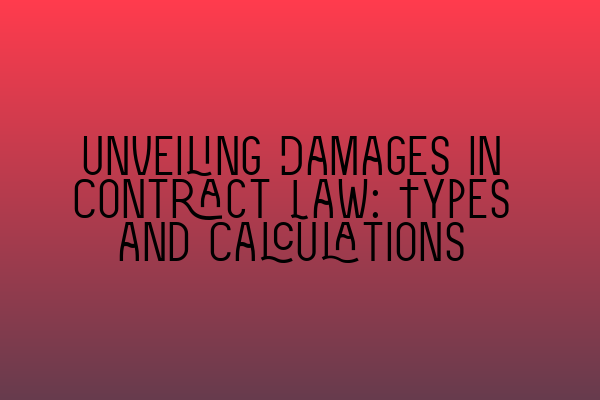Unveiling Damages in Contract Law: Types and Calculations
Contract law is a complex area, and understanding the concept of damages is crucial for solicitors and individuals involved in legal disputes. Damages, in contract law, refer to the monetary compensation awarded to the injured party when a breach of contract occurs. It is essential to grasp the different types of damages and how they are calculated to ensure a fair and just legal outcome.
Types of Damages
1. Compensatory Damages: These are the most common types of damages awarded in contract law cases. The aim of compensatory damages is to put the injured party in the position they would have been if the breach of contract had not occurred. It includes both “expectation damages” and “reliance damages”.
2. Expectation Damages: Expectation damages are awarded to compensate the injured party for the loss of the bargain they expected to receive from the contract. It involves calculating the difference between the value of the promised performance and the actual performance.
3. Reliance Damages: Reliance damages are awarded to reimburse the injured party for any expenses or investments they made in reasonable reliance on the contract. It aims to place the injured party in the position they were in before entering into the contract.
4. Consequential Damages: Consequential damages are awarded when the non-breaching party suffers additional losses that are not directly caused by the breach but are a result of the breach. These damages can include lost profits or other financial losses.
5. Liquidated Damages: Liquidated damages are specified in the contract itself, determining in advance the amount of damages to be paid in the event of a breach. This amount is agreed upon by both parties and is meant to provide certainty and avoid the need for further calculations or disputes.
6. Punitive Damages: Punitive damages are rarely awarded in contract law cases, as their purpose is to punish the breaching party rather than compensate the injured party. These damages are typically reserved for cases involving intentional misconduct or fraud.
Calculating Damages
Calculating damages in contract law requires a careful assessment of the losses suffered by the injured party. The goal is to determine how the breach of contract has financially impacted the injured party and provide appropriate compensation.
The calculation of damages often involves the following factors:
- The actual loss suffered by the injured party: This includes both direct and indirect financial consequences.
- The foreseeable loss: Damages may include losses that were reasonably foreseeable by both parties at the time of entering into the contract.
- Any attempt to mitigate the damages: The injured party has a duty to mitigate their losses by taking reasonable steps to minimize the impact of the breach.
- Non-monetary losses: Depending on the circumstances, damages may also account for non-monetary losses such as emotional distress or damage to reputation.
It is important for solicitors to make persuasive arguments and present strong evidence when calculating damages. A thorough understanding of the legal principles and precedents related to damages in contract law is crucial in achieving fair compensation for the injured party.
In conclusion, damages in contract law play a vital role in ensuring fairness and compensation for parties affected by a breach of contract. Understanding the various types of damages and the methods of calculating them is essential for solicitors and individuals involved in contract-related legal disputes. By gathering the necessary evidence and making compelling arguments, solicitors can help their clients obtain the appropriate compensation they deserve.
Related Articles:
- Barrister vs. Solicitor: A Comprehensive Comparison
- Embracing the Rise of Virtual Law Practices
- Unveiling Real-Life Case Studies: Insights into Legal Practice and Decision-Making
- Exploring Solicitor Salaries in the UK: Average Earnings and Factors Affecting Income
- Mastering Client Relationship Management: Skills for Solicitors to Enhance Trust and Loyalty
